Coming to Terms with Chinese Buddhism
ebook ∣ A Reading of the Treasure Store Treatise · Kuroda Studies in East Asian Buddhism
By Robert H. Sharf

Sign up to save your library
With an OverDrive account, you can save your favorite libraries for at-a-glance information about availability. Find out more about OverDrive accounts.
Find this title in Libby, the library reading app by OverDrive.



Search for a digital library with this title
Title found at these libraries:
| Library Name | Distance |
|---|---|
| Loading... |
The issue of sinification—the manner and extent to which Buddhism and Chinese culture were transformed through their mutual encounter and dialogue—has dominated the study of Chinese Buddhism for much of the past century. Robert Sharf opens this important and far-reaching book by raising a host of historical and hermeneutical problems with the encounter paradigm and the master narrative on which it is based. Coming to Terms with Chinese Buddhism is, among other things, an extended reflection on the theoretical foundations and conceptual categories that undergird the study of medieval Chinese Buddhism.
Sharf draws his argument in part from a meticulous historical, philological, and philosophical analysis of the Treasure Store Treatise (Pao-tsang lun), an eighth-century Buddho-Taoist work apocryphally attributed to the fifth-century master Seng-chao (374–414). In the process of coming to terms with this recondite text, Sharf ventures into all manner of subjects bearing on our understanding of medieval Chinese Buddhism, from the evolution of T'ang "gentry Taoism" to the pivotal role of image veneration and the problematic status of Chinese Tantra.
The volume includes a complete annotated translation of the Treasure Store Treatise, accompanied by the detailed exegesis of dozens of key terms and concepts.







